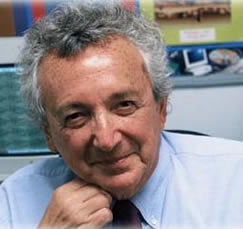

|

|
IN MEMORIAM
Gordon L. Shaw
Professor of Physics, Emeritus
Irvine
1932–2005
Professor Gordon L. Shaw, one of the founding faculty of the University of California, Irvine and of the Department of Physics and Astronomy, died on April 26, 2005 at the age of 72 from complications of renal cancer. Gordon Shaw made many contributions both to physics and to the theories of memory and learning.
Gordon Shaw was born in Atlantic City, New Jersey and educated at the Case Institute of Technology (B.S., 1954) and Cornell University (Ph.D., 1959) , where he did his doctoral work under the supervision of Professor Hans Bethe. Prior to coming to Irvine, he was a research associate at Indiana University from 1958 to 1960 and an assistant research physicist at the University of California, San Diego from 1960 to 1962. From 1962 to 1965 he was on the faculty of Stanford University, and in 1965 he came to Irvine where he stayed until his retirement in 1994. After retiring he devoted himself primarily to research in theories and methodology of learning and memory. He was a founder of the nonprofit Music Intelligence Neural Development Institute (MIND), whose goal was to improve learning of mathematics.
Gordon's thesis work was in nuclear physics, specifically on the optical model for neutron-nucleus interactions. Soon his interests shifted to elementary particle theory where, during the next thirty years, he made significant contributions to our understanding of low lying resonances, dispersion relations, high energy scattering and Grand Unified Theories. He looked extensively at the possibility of the existence of free quarks. Gordon not only looked at the theoretical issues involved in the existence of free fractional charges, but was also heavily involved in an experimental program that consisted of exposing targets to intense beams at various accelerators and then using an automated oil drop apparatus to search for such charges.
For the past 30 years, his research interests shifted to theoretical neurobiology and to theories and methodology of learning and memory. At Irvine he was a member of the Center for Neurobiology of Learning and Memory, and as mentioned earlier, after retiring he did much of his work at the MIND Institute. A highlight of his work was a link between music and spatial temporal reasoning. A technical article in Nature was picked up by the media and dubbed the “Mozart Effect.” At various elementary schools, Gordon and other researchers at the Institute were engaged in trying to improve the learning of mathematics through music.
As a founding member of the Irvine campus he contributed to the creation here of a climate of quality scholarship and teaching. He supervised over a dozen students in their doctoral studies and mentored a large number of postdoctoral researchers. He was married to Lorna, with whom he enjoyed spending time at their house in New Zealand. In addition to Lorna, he is survived by three children, Karen, Bruce and Robin, four grandchildren and a brother, Arthur. His family and his colleagues will miss his irrepressible enthusiasm for things he considered important or fun.
Myron Bander
Department of Physics and Astronomy
University of California, Irvine
Mark Bodner
MIND Institute